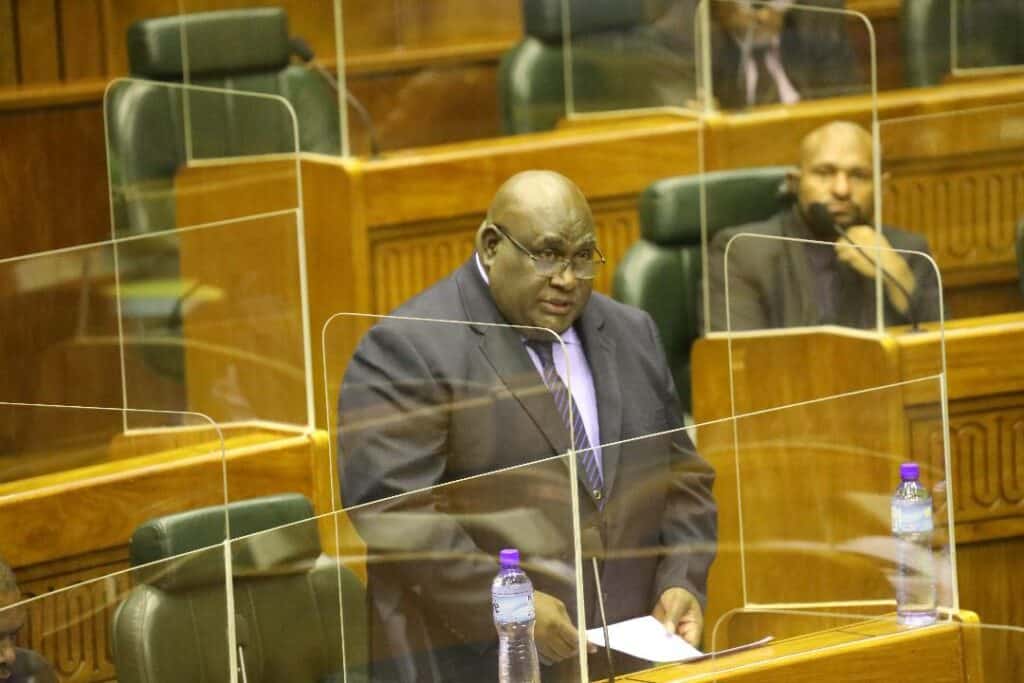Papua New Guinea Minister for Communication & Information Technology, Timothy Masiu, has again assured that the anticipated PNG Media Development Policy is not meant to ban or regulate media.
His latest comments came during the signing of two milestone memorandums of understanding in Suva this month with The University of the South Pacific’s Journalism Programme.
The MOU with the PNG state-owned broadcaster, National Broadcasting Corporation, was signed by NBC managing director Kora Nou and witnessed by Masiu and USP vice-chancellor and vice-president regional campuses and global engagement, Dr Giulio Paunga.
Nou also signed the MOU for the Pacific Islands News Association in his capacity as president.
PNG’s draft media policy, announced on 06 February this year, was designed to improve democracy, and support the country’s development, according to Masiu.
There were, however, strong initial concerns in PNG and in regional countries that the policy could increase the regulation of journalists and the media, as was the case in Fiji, with its Media Industry Development Act, which was repealed by the new Fiji Government on April 6 this year.
“We are promoting free media – free media must always be the pinnacle of what we do in terms of what we do as a democracy and economy in PNG and the Pacific as well,” said Masiu.
“The PNG Media Development Policy is not going to ban media or regulate media. It is not that.
“We are proposing a policy that will help improve working conditions of journalists and reporters in PNG.”
Masiu, a former journalist, said he was aware of the challenges media colleagues faced in terms of pay, accommodation, resources and working conditions.
“We don’t have equipment to work with, cameras are falling apart, recorders falling apart, editing machines are not working – so all these things, we want to capture in the policy so that it can become stronger,” Masiu assured.
“[And it] means putting government on notice that we should look after our media and make them work freely, without even saying no to certain things.
“We want to have an open and robust conversation on how to address impediments. We will also get the Media Council in PNG to be more vigorous in doing their work in helping our media in the country.”
Masiu said the draft policy was in the final stages, which was public consultation.
It is understood an initial consultation process was held following the announcement in February, lasting just eleven days. The minister granted an extension, which was followed by a consultative workshop on 02 March.
Pacific media expert Dr Singh welcomed the Minister’s assurances.
“We understand that there are challenges with PNG media, as with the media in other Pacific Island countries. Usually, these problems relate to lack of capacity. Training and development are the answers, not censorship,” said Dr Singh.
Dr Singh is the co-lead author of a report with Dialogue Fiji executive director Nilesh Lal on the Fiji Media Industry Development Act 2010 – An Analysis, which touched on important lessons and insights on the challenging issue of media freedom and regulation in a multiethnic society with conflict dynamics like Fiji.
Dr Singh had earlier expressed concerns about PNG’s proposed media policy in his column in the East Asia Forum and in an article in the PNG Post Courier newspaper.
He said the PNG draft media proposal had parallels with the legislation in Fiji, where journalists feared retribution for critical reporting.
“We hope that PNG Communications Minister Masiu is correct and that the journalists will not be suppressed or penalised,” Dr Singh said.
In his previous comments, PINA president Nou said news media of the Pacific were as unique as the islands and cultures they come from.
He said the media played a crucial role in shaping a healthy democracy and exposed corruption in the democratic system in the hope that governments would address these problems and put in place policies and systems that were accountable and transparent and served its citizens well. Nou had said without a free, neutral, and active media, democracy was meaningless.
